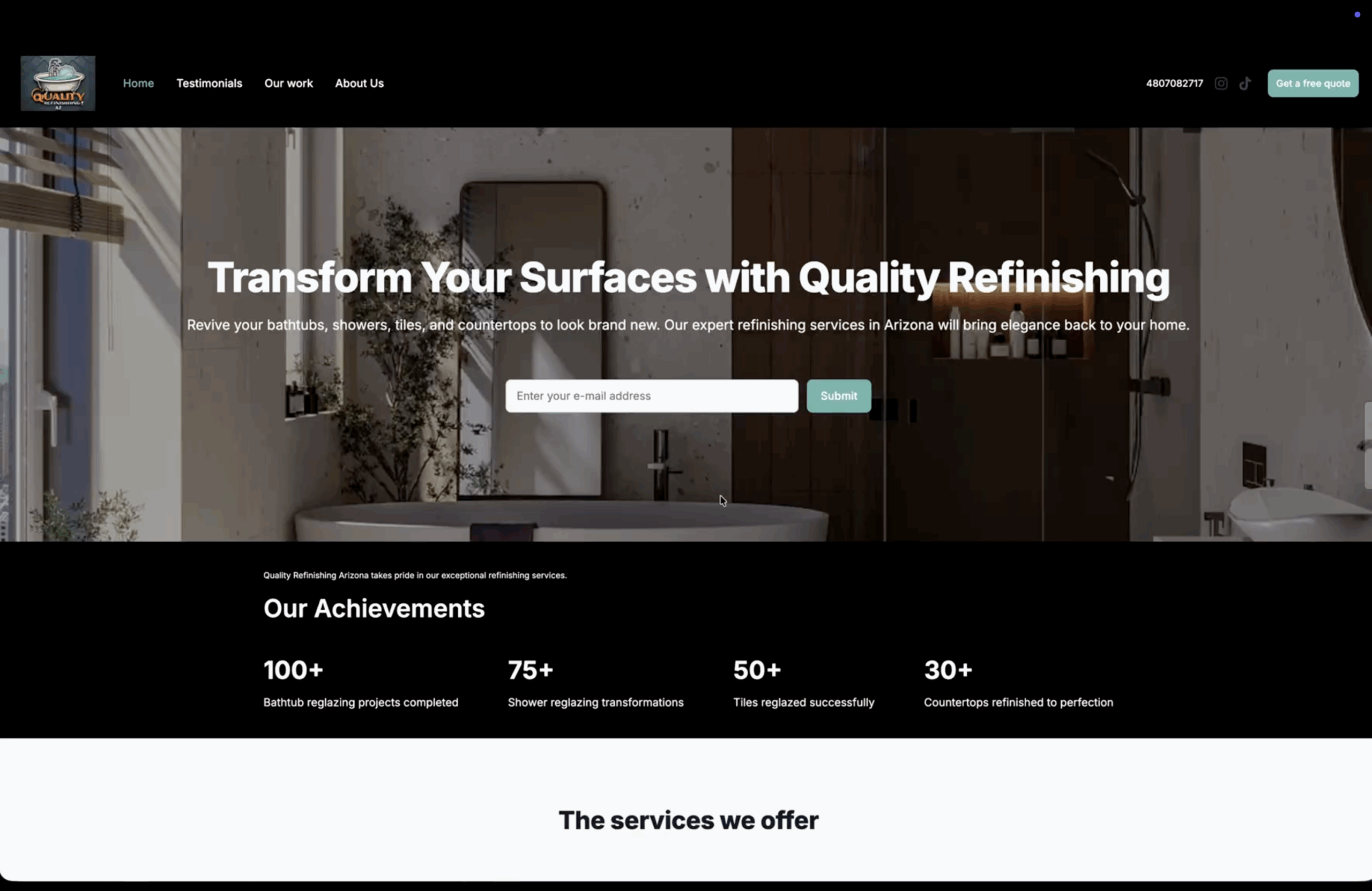Ever wondered what actually happens when you type in a web address on your browser, say “thisismywebsite.com,” then press enter? That bridge from typing in a web address to landing on an actual website is all thanks to the power of website hosting.
In case this concept is brand new to you, website hosting is the service that makes the files, images, and code that power your website accessible on the internet.
Thinking of it another way: your site lives on a server, and when someone clicks your link, that server “hosts” the content they see. So when we say a site is “hosted,” we’re really talking about where it’s stored and how it’s served up to visitors around the world.
But not all hosting services are created equal. Whether you’re running a freelance portfolio, launching a store, or building a blog, the reliability, speed, and scalability of your host will directly impact how quickly your site loads, how secure it is, and whether it can handle heavier traffic when your brand picks up steam.
If you’re serious about looking professional online, choosing the right website hosting is the first move you can’t afford to get wrong.
What is web hosting?
Website hosting is a service that stores your website’s files and makes them accessible on the internet.
When you create a website, all its files, like images, text, and code, need to be stored somewhere so people can visit your site online. Website hosting companies provide this storage space on special computers called servers, which are always connected to the internet.
As a small business owner, you pay a hosting provider to keep your website running smoothly and available to customers 24/7. The hosting company handles the technical side, so you don’t need to worry about maintaining servers or keeping your site online.
This lets you focus on your business while your website is accessible to anyone, anywhere, at any time.
What are the main types of website hosting and what do they cost?
- Shared hosting – Think of this like renting a desk in a busy co-working space. You’re sharing the internet “plumbing” with other sites, which is why it’s so cheap ($3 – $10/month). It’s perfect if you’re just getting your business online: a local coffee shop menu, a photographer’s portfolio, or a personal blog. Just know that if one neighbor’s site suddenly goes viral, your site might slow down a bit.
- VPS hosting – This is like moving into your own office inside that building. You’re still sharing the property, but you’ve got your own locked door. It runs faster and gives you more control ($20 – $80/month). I’ve seen growing ecommerce stores and small agencies make this move once sales pick up.
- Dedicated hosting – Imagine buying the whole building. It’s yours, 24/7. No sharing, no slowdowns. If your site gets thousands of visitors a day or downtime would cost you serious money, this is your choice ($80 – $500/month).
- Cloud hosting – Instead of one building, picture your website living in a bunch of buildings at once. If one goes down, your site keeps running smoothly. It’s pay-as-you-go, so you’re only paying for what you use. I recommend this to fast-growing startups or anyone who expects unpredictable traffic spikes.
Choosing the right website hosting can feel overwhelming when you see how many options you’ve got. The type you pick will affect how fast your site runs, how much control you have, and how much you pay.
Just refer to the breakdown above so you can match the right hosting plan to your business’ needs.
How do you choose the right web hosting provider?
Choosing a web hosting provider isn’t just about picking the one with the lowest price or the prettiest homepage. It’s about matching your current needs with the right tech, support, and room to grow.
Make sure you’re set up with a host that’s going to keep your site fast, safe, and online, even when things get hectic.
What should you look for in a hosting provider?
- Your website’s goals and traffic expectations. A simple portfolio site doesn’t need the same horsepower as an e-commerce store handling thousands of transactions.
- Your budget now vs. your future growth. Website hosting costs can vary between what you need today as a small business owner vs what you need once your business has grown a ton.
- Customer reviews and real stories. Scan review sites like Trustpilot, Reddit threads, or even Facebook groups. Look beyond the 5-stars-check what people say when something breaks.
- Support that actually helps. 24/7 live chat is nice, but what happens when you hit a 502 error at 2 in the morning? Look for responsive, knowledgeable support teams with a good reputation for solving issues quickly.
The right website hosting provider gives you peace of mind, fast load times, and real-world support. If you’re managing a website alongside your business, like many Bookipi users do, don’t let hosting become a weak point.
What’s the difference between domain registration and website hosting?
Think of a domain name as your home address on the web (like bookipi.com), while your hosting is the actual house where all your content, images, and files live. Both are essential but they don’t always come in the same package.
Can you buy both from the same provider?
Providers like Bookipi or Bluehost bundle domain registration with website hosting plans to keep things simple.
Many people opt for this option because it’s often the most convenient. Unless you have very specific technical requirements or are working with a website developer.
Do branded domains really help with reputation?
Using a custom domain name (like yourname.com or coffeecartstudio.com) shows customers that you’re professional and reliable.
It looks way more legit than something like yourbiz.wordpress.com or yoursite.wixsite.com.
A branded domain also has some additional benefits, like:
- Owning a custom domain lets you create professional email addresses (you@yourdomain.com) to build trust with clients and partners
- SEO performance tends to be better for branded domains over time
- Brand recognition improves when your URL matches your business identity
If you’re still juggling domain names and hosting decisions, remember this: get a domain that’s branded and easy to remember.
Pick a reliable host that gives you control and isn’t bloated with upsells. Keep it separate or bundled. Just make sure you actually own your stuff.
With our AI Website Builder, you can pick out a custom domain name that’ll make your site look professional from the get-go.
Don’t know what your domain name should be? We also suggest some great available names related to your business with our AI.
What should you know about website hosting plans and costs?
Website hosting doesn’t need to be confusing or expensive. Whether you’re freelancing solo or running a growing business, the right hosting plan gives you both flexibility and peace of mind.
Let’s break down some questions you might have at this point, so you only pay for what you really need and avoid any nasty surprises down the line.
Is an entry-level shared hosting plan good enough?
If you’re just launching your freelance portfolio or a basic business website, yes, shared hosting is often more than enough.
And if you pick a good hosting provider, you won’t need to worry about common issues you might face with sharing hosting, like your website load speed slowing down too much.
Should you pay monthly or go long-term?
Going month-to-month can help with cashflow and save you from upfront costs. Many older hosting companies will even reward longer commitments, say 3 years, with serious discounts.
Here’s how the pricing usually plays out:
- Monthly: Great for testing or freelance gigs. Expect to pay 20-40% more than the annual plan.
- 1-Year Contract: Most common. Locks in discounts and includes promo bonuses (like a free domain).
- 3-Year Contract: Lowest price per month-but big upfront cost.
I always tell new small biz owners: try monthly first. See how it fits. Then commit once you’re confident.
You don’t need to commit to the longest-term contracts either. Yearly subscriptions can deliver the best balance between affordability, flexibility, and value for money.
Are there hidden website hosting costs to watch out for?
Yep. Always check the fine print.
Watch for these traps:
- Renewal pricing: That $3.99/month plan might jump to $19.99 after the first year.
- Backup restores: Free backups don’t always mean free restores. Some hosts charge per recovery.
- Site migration: Moving your site in might be free, but moving out could cost you.
- Email mailbox fees: Some entry plans don’t include email, or only support webmail without forwarding.
- Add-on upsells: Be ready to uncheck extras during checkout like SEO tools or premium security.
So before you buy, ask yourself: what do I really need right now? And what am I willing to pay for later?
Choosing your website hosting plan should match your current business goals, not a list of made-up must-haves. Pick what works now. Then only upgrade when it makes sense.
Truth be told: you don’t need that much to start.
Tips to maximize website hosting costs
If you’re a freelancer or small business owner trying to make smart decisions on your website hosting cost, you’re not alone. Most hosting plans look affordable upfront, but the real cost adds up when you’re juggling add-ons like domains, backups, and SSL certificates.
Here’s the reality: US-based small businesses spend anywhere from $50 to $200 per year on basic web hosting. This can climb fast if you need scalable storage, dedicated servers, or e-commerce functionality.
So how do you keep costs low without tanking your website experience?
Think bundled, not fragmented
Bouncing between a domain registrar, hosting company, and email provider? That’s years off your life trying to manage billing cycles and integrations.
Instead, choose platforms that combine what you need into one plan.
Bookipi’s AI Website Builder is a solid example. You get a domain, website hosting, AI design help, and more, all under a single subscription. That’s one price tag, no mental gymnastics.
Compare real value, not just price
Cheap hosting sounds great until your site crashes during prime traffic hours. But expensive hosting plans could just mean paying for things you never really need.
Instead, start simple. Go with only what you know will help you get your website up and running. This is going to be a domain and a website.
Pay yearly if your budget allows
Many hosting providers offer lower rates if you commit to an annual or 3-year plan. Monthly might feel safer, especially in the beginning when you’re testing things out, but it ends up being pricier long term.
Pro tip: If you’re still validating your business idea, start with a free plan like Bookipi’s. Once that idea starts generating real income, then upgrade to a professional domain and commit to a longer, better-value plan.
Use built-in tools to skip outside costs
Gone are the days when you’d have to spend weeks or even months building a website from scratch. Now, you can look for AI features, drag-and-drop builders, and integrations that save you money on designers or developers.
Bookipi’s AI Website Builder, for example, helps you spin up a great-looking, functional site without paying a web agency $2,000+ just to get started.
Track your actual traffic needs
Don’t fall for the “unlimited” storage or bandwidth pitch unless you actually need it.
Sites with fewer than 10,000 monthly visitors typically don’t exceed 5GB bandwidth or 1GB storage.
Use Google Analytics to track your true needs before upgrading to more expensive plans.
Website hosting should work for your business
At the end of the day, website hosting should be quick and simple for busy business owners like you. Don’t get bogged down by all the complex options out there, and stick to options that keep your website hosting costs low until your business grows.
That’s where Bookipi’s AI Website Builder comes in. You get a complete solution to combine hosting, domain, and AI tools to save you time and cash.
Plus check out these other tools that’ll help you run your business with ease:
- Invoice maker. Easily generate invoices with your phone or computer.
- Appointment scheduler. Get leads and customers to schedule appointments with you, and automatically sync to your calendar availability.
- eSignatures. Get any document signed electronically to save you and your clients time.
- Proposal maker. Instantly generate beautiful proposals for leads to win projects faster.




